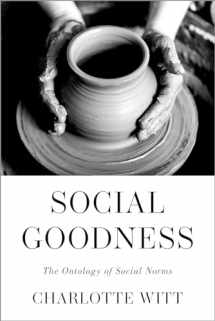
Social Goodness: The Ontology of Social Norms
Book details
Summary
Description
We are all immersed in a sea of social norms, but they are sometimes tricky to observe with any clarity. They are often invisible to us and emerge only when they are not observed. Social norms are important to understand because they are both limiting of our freedom, such as gendered and racialized norms, and at the same time the very conditions of our agency.
Social Goodness presents an original, externalist answer to the question of the source or origin of social role normativity. Rather than grounding social normativity in the attitudes of persons, the book argues for an externalism that roots social role normativity in the social world itself: in its positions, institutions, and larger architecture. The core insight of externalism is that the function or structural feature of an enterprise or activity can bring with it normative demands quite independently of the attitudes of those who engage with it. According to the artisanal model, just as a carpenter, ceramicist, or chef is responsive to and evaluable under a set of artisanal norms or techniques, so too is a mother and or an academic or a President. The source of normativity is this technique or expertise, independent of the preferences, endorsements, or recognitive attitudes of individuals.
The artisanal model for social role normativity has resources to explain both the "stickiness" or persistence of social norms and our ability to criticize existing norms and to engage in normative self-creation--to create new normative selves. The artisanal model also has resources to capture and express the social situatedness, locality, and materiality of social roles. The relational ontology of social roles, implicit in the artisanal model, provides a useful frame to consider both hierarchical and oppressive social relations.


We would LOVE it if you could help us and other readers by reviewing the book
Book review



